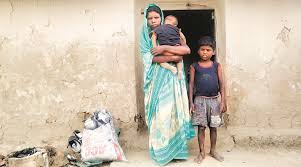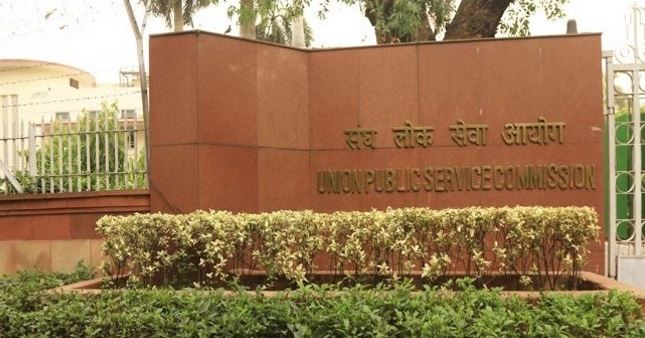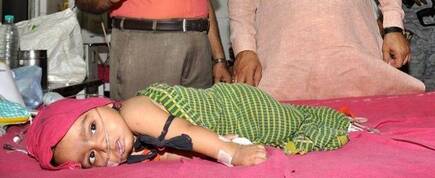Source: indianexpress.com
Jhingur Bhuyia, 42, died in Dorhagara village of Kanhachatta block of Jharkhand on Tuesday night. He left behind two children aged six and one, and wife Rubi Devi, who attributed his death to illness and lack of food.
Rubi Devi said her husband, who used to work as a daily wage labourer, was paralysed for a year, and the family did not have any income or a ration card. Her husband’s death, she said, was due to “his prolonged illness and lack of food at home, due to which he could not be fed well.”
She said she had borrowed Rs 100 from her neighbours to buy milk for her husband.
Denying that Bhuyia’s death was caused by hunger, Deputy Commissioner Jitendra Singh told reporters, “Prima facie, the death was due to illness.”
According to Singh: “Two months ago, Bhuyia had a paralytic attack on his face and could not eat solid food. The family had a ration card in his mother’s and sister-in-law’s name and his family got their share. There was a request by Bhuyia’s wife to add their names in the ration card, which has now been done. Our investigation says there was no food scarcity at home. This is not a case of death due to hunger.”
SDO Deepu Kumar, part of the inquiry team, told The Indian Express that the “actual cause of death” will be known after the post-mortem report. He added, “It is a baseless claim that the family did not have a ration card.” Bhuyia’s mother Maso Budhni (now deceased) had an Antyodaya Anna Yojna (AAY) card and his sister-in-law Basanti Devi has a ration card.
Rubi Devi said, “These cards are not in our name, and are being used by my brother-in-law who lives separately. They used to give me around 5-6 kg rice, which we could use for a few days. For the rest of the month, we had to often depend on other villagers.”
AAY households constitute the poorest of the poor and are entitled to 35 kg foodgrain a month.
Rubi Devi said she received her Aadhaar card a few months ago, but could not get a ration card from the local PDS dealer despite going to his shop several times. The PDS dealer could not be contacted. “Before his death, it was a struggle, I had to ask everyone for food. Many people helped…,” Rubi Devi said, sitting outside her kuccha house. “Our food comprised rice and potatoes. Rarely did we have pulses.”
She added, “We have a small piece of land, but due to lack of water, the produce is limited to one season. We will harvest corn in a few months. This is divided between the three brothers, and we don’t get much.”
She also said she was never offered any job under MGNREGA. The MGNREGA website states that Bhuyia had a job card made in his and his wife’s name in 2007, but does not have any work details.
When contacted, the panchayat’s Mukhiya Rajwanti Devi said the family never approached her for any job or problems. “The family should have told us so that I could have gone to higher officials,” she said.
According to the family members, Bhuiya was treated at an “ayurvedic centre” in Bishnugarh, more than 100 km away. Villagers said they did not trust the public health centres (PHC) as the doctors are usually not available. Less than 2 km from the village at Kanhachatti block area, an additional PHC is run with three Auxiliary Nurse Midwives (ANM). There is no doctor. ANM Sulekha Kumari said, “Doctors rarely visit this centre, few people come to us. Deliveries happen quite often, but we face problems because of water scarcity. We get water in buckets from neighbouring area for deliveries.”
On this, DC Singh said he would have to check, “It is a fact that there is shortage of doctors and vacancy of 130 doctors in Chatra,” he said. An additional PHC covers population of 20-30,000 and acts as a referral unit for health-sub centres.



